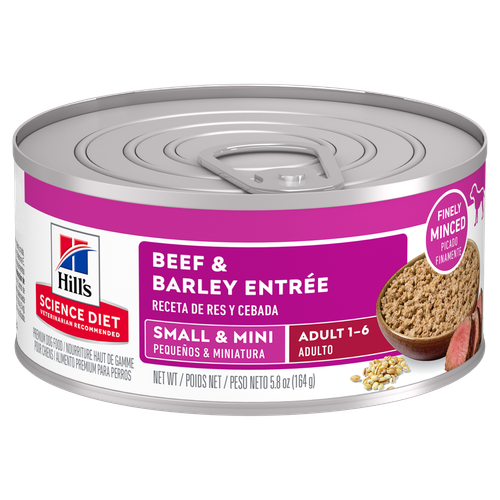
-
Find the right food for your petTake this quiz to see which food may be the best for your furry friend.Find the right food for your petTake this quiz to see which food may be the best for your furry friend.Featured products
 Adult Sensitive Stomach & Skin Chicken & Barley Recipe Dog Food
Adult Sensitive Stomach & Skin Chicken & Barley Recipe Dog FoodScience-backed nutrition tailored for skin and digestive health, packed with clinically proven, immune system supporting antioxidants.
Shop Now Chicken & Barley Entrée, Beef & Barley Entrée
Chicken & Barley Entrée, Beef & Barley EntréeChicken & Barley recipe and Beef & Barley recipe with precisely balanced nutrition to keep adult dogs active and healthy.
Shop Now Adult Stomach & Skin Salmon & Brown Rice Recipe Dog Food
Adult Stomach & Skin Salmon & Brown Rice Recipe Dog FoodScience-backed nutrition tailored for skin and digestive health, packed with clinically proven, immune system supporting antioxidants.
Shop NowFeatured products Adult 7+ Indoor Chicken Recipe Cat Food
Adult 7+ Indoor Chicken Recipe Cat FoodSupports energy level and beautiful fur in mature indoor cats
Shop Now Senior Vitality Adult 7+ Tuna & Vegetables Stew
Senior Vitality Adult 7+ Tuna & Vegetables StewImproves Everyday Ability to Get Up & Go
Shop Now Adult Turkey & Liver Entrée Cat Food
Adult Turkey & Liver Entrée Cat FoodPrecisely balanced nutrition with the delicious taste of minced turkey & liver to help fuel the energy needs of cats during the prime of their life
Shop Now -
Dog
- Dog Tips & Articles
-
Health Category
- Weight
- Food & Environmental Sensitivities
- Urinary
- Digestive
- Joint
- Kidney
-
Life Stage
- Puppy Nutrition
- Adult Nutrition
- Senior Nutrition
Cat- Cat Tips & Articles
-
Health Category
- Weight
- Skin & Food Sensitivities
- Urinary
- Digestive
- Kidney
-
Life Stage
- Kitten Nutrition
- Adult Nutrition
Featured articles What Is Littermate Syndrome? Pet Adoption Guide
What Is Littermate Syndrome? Pet Adoption GuideLearn more about littermate syndrome in dogs and cats and how to successfully navigate adoption and early socialization processes.
Read More How to Properly Mix Wet & Dry Pet Foods
How to Properly Mix Wet & Dry Pet FoodsAn Orange cat eating from a bowl filled with mixed food
Read More The Science Behind Our Love for Pets
The Science Behind Our Love for PetsLearn the scientific reasons why we have such strong connections with our pets, and what science says about the love between humans and our furry friends.
Read More -


Signs of Stress in Cats
Signs of stress in cats may include:
- Trembling
- Withdrawal
- Hiding
- Changes in activity level (more or less active)
- Attempts to escape
- Excessive scratching or chewing
- Aggressive behavior or body language (hissing, dilated pupils, flattened ears, raised fur, tucked tail)
- Diarrhea
- Failure to use the litter box
- Changes in appetite
- Overgrooming (may result in sores or missing patches of fur)

Causes of Stress in Cats
Stress and feline health are linked. Signs of stress in cats can result from a wide range of physical and behavioral causes.
Pain
Cat stress often arises from pain, such as from an injury or chronic condition. For example, senior cats who develop arthritis can experience discomfort throughout their whole body. This can impair mobility, making it difficult to squat or self-groom, which may result in accidents outside the litter box or an unkempt appearance. If your cat is in pain, they may also hide or shy away from your touch.
Illness
Anything from fever to constipation to decreased kidney function can leave your cat feeling out of sorts and increase their stress levels. If you have more than one cat in your home, illness can impact how cats relate to one another. One sick cat can increase stress in other cats in the home.
Poor Socialization
Kittens who aren't properly socialized can act fearful when faced with something new — whether that's another pet, human family member or experience. If you didn't adopt your cat as a kitten, they may have negative associations with certain experiences from kittenhood (e.g., kids handling them, exposure to dogs) that trigger stress behaviors.
Cognitive Changes
Some cats experience cognitive changes, such as memory problems, in their senior years. Chemical changes in the brain can prompt obsessive behaviors, such as exaggerated or repetitive yowling; excessive grooming; eating, chewing or sucking on inedible items, such as fabric; or self-injury, such as attacking their tail. Certain breeds, including Siamese, Burmese and Abyssinian cats, may be at higher risk of these behaviors.
Decreased Sensory Abilities
As your cat ages, their hearing, sight and smell decline. This can affect how they interact with the world. If your cat doesn't see or hear well, they may be more easily startled, which can lead to stress.
Environmental Challenges
Changes to a cat's usual environment — such as rearranged furniture or a new family member in the home — can cause stress in cats. Older cats may be more sensitive to household changes since their ability to adapt to new situations declines over time. Insufficient resources, including litter boxes and scratching objects, an unclean litter box and lack of environmental enrichment can also cause stress.
Fear of Separation
Some cats become stressed when they're left home alone. This is especially prevalent among cats who have been rehomed or have a history of abandonment.



Tasty Tips
How to Help a Stressed Cat Cope
Never punish or scold your cat for unwanted behaviors — period. This only increases fear and makes things worse. Here are a few strategies that can help you minimize stressors and get your cat back to feeling their best.
Consult Your Veterinarian
If you see signs of stress in your cat, make an appointment with your veterinarian to diagnose, rule out or address any underlying health concerns. In some cases, your vet may recommend stress-reducing medication. They can also help you choose a complete and balanced food for your cat's life stage to ensure they're getting the nutrients they need to thrive.
Seek an Animal Behaviorist's Help
Depending on their assessment, your vet may refer you to an animal behavior specialist. Behavior experts can help you identify stress triggers and reduce unwanted behaviors by eliminating triggers. They may also try desensitizing or counterconditioning your cat, which involves safe, repeated exposure to triggers or new, positive associations with triggers, respectively.
Enrich Your Cat's Environment
Environmental enrichment supports emotional and physical health and helps cats feel safe and relaxed. Here are some simple ways to enrich your cat's environment:
Add Lookouts
Cat trees, perches and shelves allow cats to relax far away from perceived danger. Place them near windows so they can watch birds and critters go by.
Support Sensory Stimulation
Set up feeders and birdbaths by windows. Bring a box of leaves inside so your cat can crunch and sniff. Grow cat grass so your cat has something fresh to nibble on.
Offer Hideaways
Boxes, tunnels and other safe havens can help cats feel secure and provide a quiet place to escape the commotion.
Provide Multiple Scratch Options
Scratching relieves cat stress by marking objects with pheromones that signal safety. Buy a few options at your local pet store, or Burmese at home!
Set Up Multiple Potty Spots
Sharing facilities is stressful for many cats, and some cats prefer one box for solids and another for liquids. Offer one litter box per cat plus one (two for one cat; three for two cats), and place them in different rooms to ensure everyone has easy access.
Keep Litter Boxes Clean
Scoop litter boxes at least one to two times a day.
Separate Food and Litter Stations
Some cats will avoid their litter box altogether if it's uncomfortably close to where they eat.
Create a Food Treasure Hunt
Relieve boredom and encourage your cat's natural hunting instinct by placing puzzle toys filled with treats or your cat's usual food around the house (factor this into their daily caloric intake to support a healthy body condition).
Supporting Your Cat's Calm
Chronic stress can have a physiological effect on your kitty's health. Getting your cat the care they need is in their best interest, and it helps maintain a peaceful home. With love, patience and help from your veterinarian, your cat can get back to their healthiest, happiest self.


Amy Shojai, is a certified animal behavior consultant, and nationally known authority on pet care and behavior. She began her career as a veterinary technician and is the award-winning author of more than 35 prescriptive nonfiction pet books
Related products

Improves Everyday Ability to Get Up & Go

Supports energy level and beautiful fur in mature indoor cats

Precisely balanced nutrition with the delicious taste of minced turkey & liver to help fuel the energy needs of cats during the prime of their life

Delectable chunks with tender chicken smothered in a rich gravy
Related articles

Discover how to train your cat, starting with very basic first steps that both reward good behavior and discourage the bad.

Discover which cat toys games your feline friend might like, and how they are great sources of exercise. Explore our library of articles to learn more.

Learn how to litter train a kitten with this guide to potty training, including when to start litter training kittens and troubleshooting tips.

When you adopt a cat, you don't just gain a best friend; you also save her life. Here's why getting a cat from a local animal shelter makes so much sense.

Put your cat on a diet without them knowing
Our low calorie formula helps you control your cat's weight. It's packed with high-quality protein for building lean muscles, and made with purposeful ingredients for a flavorful, nutritious meal. Clinically proven antioxidants, Vitamin C+E, help promote a healthy immune system.
Put your cat on a diet without them knowing
Our low calorie formula helps you control your cat's weight. It's packed with high-quality protein for building lean muscles, and made with purposeful ingredients for a flavorful, nutritious meal. Clinically proven antioxidants, Vitamin C+E, help promote a healthy immune system.

